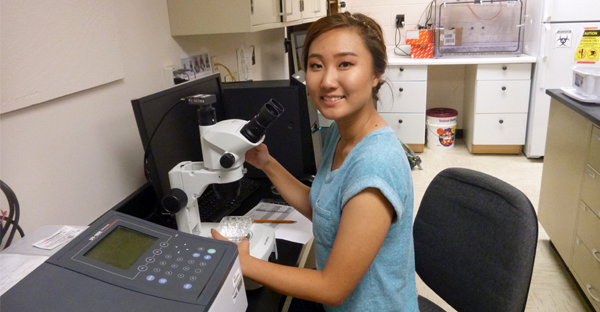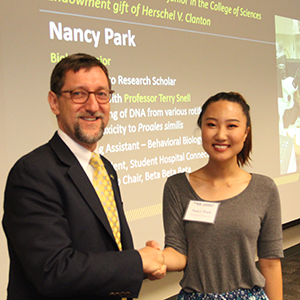Through her time at Georgia Tech, Nancy Park has challenged herself in her coursework, formed life-long friendships, fostered relationships with professors, and discovered what it truly means to be a Georgia Tech student. Now graduating, she looks back on her years at Tech with fondness and appreciation for the many opportunities she explored.
In the second semester of her freshman year, Park, a biology major, started research with the Biology Fast Track to Research Program. This early exposure to research helped her comfortably discover the research environment with support from mentors and peers.
Though students typically begin research later in their academic career, the Fast Track initiative aims to get undergraduate students in a research environment early on. The program website explains that early exposure to undergraduate research builds professional and interpersonal skills, establishes a relationship with faculty, and complements coursework.
The Biology Fast-Track to Research Scholarships are awarded to entering first year biology majors with a strong interest in research. Fast-Track Scholars receive a $1500 stipend to conduct research for 10 hours per week in the research lab of a biology faculty member in the spring or summer semester of the first year at Georgia Tech.
Hear more from Park about the Fast-Track Program and her Georgia Tech experience:
What attracted you to Georgia Tech?
When touring Georgia Tech, I was really struck by how driven the students were to finding creative solutions to today's problems. I was so impressed by the strong work ethic I saw in the student body and wanted to go to a place where everyone around me inspired me to be better.
How has your experience in the Fast-Track Program enhanced your Tech experience?
As a high school senior, I was incredibly uninformed about the world of research. I think participating in the Fast-Track Program was the leap of faith I needed to accomplish many of my aspirations. Early research exploration helped me comfortably tackle inquiry-based assignments in my classes and learn scientific literacy at an accelerated pace. I became comfortable with critically analyzing journal articles in front of faculty because I knew the methodical precision needed to design, refine, and redesign experiments. I think it also allowed me to confront failure and see it as a didactic tool rather than something to catastrophize over.
What do you enjoy about conducting research? Have any projects or experiences stood out to you?
There's always the day-to-day little things to enjoy about working in a lab. The bubbling emerald hues of an algae culture, the explosion of a rotifer population, and the satisfaction of an abundant resting egg harvest. A lot of the early stages of an experiment or a new technique can be incredibly frustrating as you and your research group puzzle over why something isn't working. But the gratification of a success makes everything worth it. When you find yourself settling into a routine with a skill you struggled with at first, you know you've made it!
Undertaking my senior honors thesis was definitely my biggest challenge, as I had never had so much responsibility over experimentation nor expectations of writing so much. But it was certainly a worthwhile effort, and one that I know has prepared me for future research opportunities. At my summer research internship, I also really enjoyed being able to assist in debridement and graft of burned pig tissue; this experience really solidified my desire to become a surgeon.
What professors have impacted your time at Tech, and in what ways?
Dr. Terry Snell served as my Fast-Track to Research mentor since my first year, and I worked in his lab for eight semesters. Unlike most undergraduates, I usually saw him every time I went into the lab, ensuring that we had frequent discussions on our ongoing projects. He was invaluable in my personal and professional growth.
Dr. Shana Kerr was also an amazing mentor, and she and I spent many hours discussing ongoing projects in the extracurricular activities I was involved in. I've also taken several classes with her, and I have always appreciated her friendliness in and out of the classroom.
I also have to mention Dr. William Ratcliff for inspiring my love for evolutionary biology. He has been an incredible instructor, and he has encouraged me to engage in many long discussions about evolutionary transitions in individuality with my friends.
What is your most vivid memory of your time at Tech?
On the last day of freshman year, my friends and I decided to pull an all-nighter together since it would be the last time we could all hang out before summer. We watched “Silence of the Lambs”, counted down the minutes until The Flying Biscuit Cafe was open, and then said our final goodbyes. I cried on the car ride home because of how much I was going to miss everyone.
What are your post-graduation plans?
I will be pursuing a medical degree at the Yale School of Medicine, where I will also pursue a fifth year to refine a medical research thesis!
What advice do you have for incoming Georgia Tech students?
Don't feel like your options are limited because of your past. This is the perfect time to decide what kind of person you want to be, and you can change at any time.
For More Information Contact
Grace Pietkiewicz
Communications Assistant
College of Sciences
katiegracepz@gatech.edu





